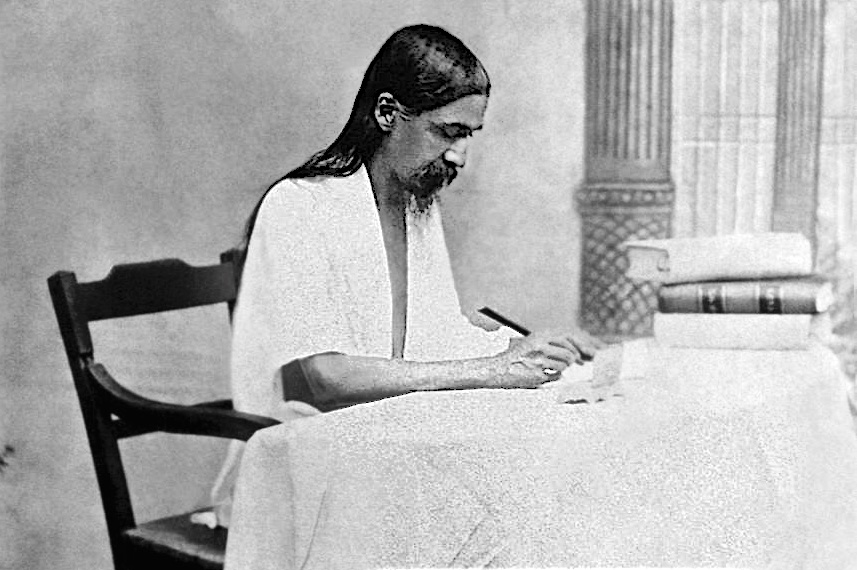Sri Aurobindo
For readers not familiar with Sri Aurobindo, we present a brief introduction.
An explorer and adventurer in consciousness, Sri Aurobindo (1872-1950) was an Indian sage-philosopher, Self-realized mystic, seer-poet, enlightened Yogi, social-political thinker, and anti-colonialist revolutionary.
Drawing on his inner spiritual realizations, the wisdom of Indian traditions and texts dealing with metaphysics, ontology and epistemology, as well as his learning in and of the West, he developed the philosophy and discipline of Integral Yoga which has for its goal not merely the fulfillment or self-realization or moksha of a few isolated individuals but the uplifting of the whole collective life of mankind.

Integral Yoga emphasizes personal transformation as a way to act towards a deeper transformation of the evolving outer world with a goal to enable a progressive and fundamental change in individual and collective consciousness.
Raina (2000) summarizes Sri Aurobindo’s life and work as follows:
“Originally a poet and a politician, not a philosopher, Sri Aurobindo engaged himself for forty-five years out of his seventy-eight years in the practice of Yoga, and developed a philosophy of complete affirmation, affirming the reality of the world from the ultimate standpoint and the meaningfulness of socio-political action from the spiritual standpoint (p. 2).”
(Sri Aurobindo, 1872–1950. Prospects: the quarterly review of comparative education. Paris: UNESCO, International Bureau of Education).
Sri Aurobindo, one of the greatest rishis and yogis of 20th century, was also the pioneering Integral seer encompassing the completeness of everything in his spiritual realizations, and expressing the implications of this integral truth through all the possible domains of human activity ranging from philosophy, sociology, cultural study, education, literature, poetry, arts, politics, business, etc.
From our archives:
Sri Aurobindo, the Rishi
Sri Aurobindo, the Eternal Presence
His written works, therefore, not only comprise his philosophical and yogic treatises but in fact cover the whole gamut of expression covering topics such as Vision for Life, Learning, Love, Beauty, Knowledge, Individual, Society, Nation, Future, World, Humanity, Divine, Everything. Nothing has been left out, and everything has been raised to the highest level of consciousness, studied from the deepest view of reality and existence, and expanded to the widest range of possibilities and potentialities. Reading Sri Aurobindo becomes a transformative experience, on many levels.
Sri Aurobindo and the Mother (his spiritual collaborator) have given to the humanity an infinitely wide, deep and high philosophy and teaching. Their published works alone comprise 54 volumes, some comprising of more than thousand pages each, and each one of them filled with profound truths and thoughts.
Shri R. Y. Deshpande, a noted litterateur, educator, widely published author and poet, a man of Science and a disciple of Sri Aurobindo introduces Sri Aurobindo in these words:
“Philosophers have described him as the finest synthesis between the East and the West; critics have acclaimed him as a poet par excellence; social scientists regard him as the builder of a new society based on enduring values of the life of the spirit; devotees throng in mute veneration offering their heart and their soul in a silent prayer that can secure for them the happy gifts of the Deity; Yogins long to live in the sunlight of his splendour to kindle in it their own suns; in the tranquil benignity of his spiritual presence is the fulfilment of all the hopes and all the keenest and noblest aspirations; gods of light and truth and joy and beauty and sweetness are busy in their tasks to carry out his will in the creation; in him the avataric incarnation becomes man to realise the divine in man. Such is the stupendous birth of the Immortal in the Mortal. He comes here now as Sri Aurobindo.”
The Complete Works of Sri Aurobindo are available for download from Sri Aurobindo Ashram’s website.
(Introduction prepared by Beloo Mehra)
